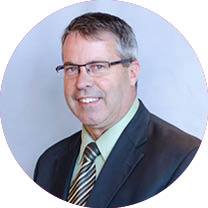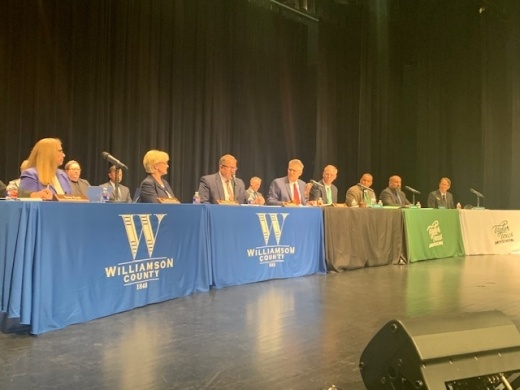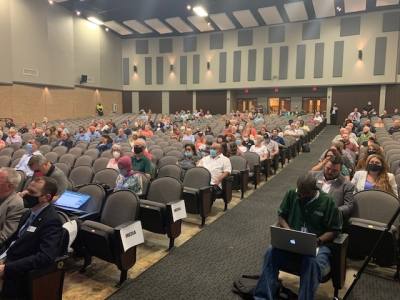In a Sept. 8 joint meeting of the Williamson County Commissioners Court and the city of Taylor, economic agreements were unanimously approved by both bodies to partner with Samsung for a $17 billion semiconductor manufacturing plant to be constructed in Taylor.
A decision by Samsung to approve the project could come late Sept. 8.
The project includes $6 billion in infrastructure, land and building costs and $11 billion worth of personal property, machinery and equipment. The approximately 1,200 acres of property for the project is south of Hwy. 79 and west of FM 973, southwest of downtown Taylor.
Williamson County Judge Bill Gravell Jr. told Community Impact Newspaper negotiations and work on the project have been accomplished daily since January, when Williamson County hosted Samsung executives at Dell Diamond in Round Rock.
“What we have to offer is the perfect combination of outstanding schools, safe communities and quality of life,” Gravell said. “We have an existing world-class workforce and an ecosystem around it.”
Samsung is expected to build a 6 million-square-foot facility that will bring 1,800 higher-paying jobs to the area. Gravell said along with the Samsung jobs, thousands of contractors will also work at the facility. According to Williamson County, the project will also provide 6,500-10,000 direct construction jobs.
“The first time I went to tour the facility Austin, I was really taken aback by the number of jobs that were not Samsung jobs,” Gravell said in reference to contractors. “For me, that was the turning point that I wanted that in Williamson County, and we were all in.”
The shortage of semiconductors is a worldwide issue, as production has slowed and supply chains of vehicles, computers and other electronics and have become a challenge—noticeable in Williamson County where fleet Chevrolet Tahoe trucks were not readily available when ordered. Gravell said there are 120 chips in a Tahoe, and while the county will wait for its order, the major issue to land the Samsung project is national security for semiconductors to be produced in the United States.
Gravell said producing the semiconductors here allows for less dependency on the international supply and will help resolve supply-and-demand issues affecting companies. He also said Samsung will partner with Taylor ISD to provide 24 internships per year for the next 30 years.
“Samsung wants to be involved immediately,” Gravell said. “Like Apple and Dell, I think they see the value in doing business with [Williamson County].”
The agreements
The Chapter 381 agreement with Williamson County calls for Samsung to have the 6 million-square-foot facility completed with a certificate of occupancy by Jan. 31, 2026, but staggers the construction with different goals to be met, starting with a certificate of occupancy for 2.5 million square feet by December 2023. Samsung would also create 1,800 full-time positions, also staggered during progression of the build-out.
In turn, Williamson County will reimburse 90% of the ad valorem taxes paid by Samsung on the property for 10 years. A 10-year extension at 85% abatement will be offered if Samsung complies with the conditions of the agreement.
For Williamson County, the investment is a win with $135 million additional ad valorem property tax revenue over a 30-year period, according to documents. The county currently receives $1,298 per year in taxes on the same property.
On Aug. 20, the Texas Comptroller of Public Accounts notified TISD it issued a certificate for limitation on appraised value of the facility. Under that agreement, Samsung would receive a cap on the estimated taxable value for TISD maintenance and operations ad valorem tax purposed at $80 million per year for 10 years beginning in 2024. From 2022-38, the savings would be $314,114,505 over those years with the 10-year cap, according to documents.
The comptroller’s office stated in its letter to the district “...the project proposed by the applicant is reasonably likely to generate tax revenue in an amount to offset the school district’s maintenance and operations ad valorem tax revenue lost as a result of the agreement before the 25th anniversary of the beginning of the limitation period.”
On Sept. 8, Taylor City Council passed tax and development agreements that will include property tax abatements under a tax increment reinvestment zone for 92.5% in years 1-10, 90% for years 11-20 and 85% for years 21-30 as long as conditions of the agreement are met.
The city’s agreement also calls for Samsung to make annual civic donations of no less than $300,000 per year to civic and charitable providers in Taylor and $150,000 per year to the city charitable trust for betterment of the community.
On Sept. 9, Taylor City Council will meet in back-to-back meetings to designate the 1,200 acres of property in the city’s extraterritorial jurisdiction as a TIRZ, which allows the city to abate ad valorem property taxes to the property owners. When Samsung owns the property, it would mean the company would be exempt or rebated for a portion of taxes on the property. Samsung would also request voluntary annexation into the city of Taylor for municipal services.
The competition
Samsung had been eyeing several locations, recently narrowed down to Williamson County and Austin in Texas; Goodyear, Arizona; Genesee County, New York and in South Korea, where Samsung has its headquarters.
Samsung in applications said Texas would need tax agreements to be competitive with other potential sites.
“Due to the higher tax cost of operating in Texas, the appraised value limitation is a determining factor,” according to documents in the application submitted to the comptroller’s office. “Without the appraised value limitation award, the company would likely locate the project in Arizona, New York or Korea.”
The company will also benefit from the Creating Helpful Incentives to Produce Semiconductors (CHIPS) in America Act, co-sponsored by Sen. John Cornyn, R-Texas, to help restore semiconductor manufacturing in the United States. Billions in federal funding will help support semiconductor manufacturing growth in the future.
The project had multiple local options in Central Texas, including Travis County and the city of Austin, where Samsung has a large presence with a semiconductor facility along East Parmer Lane.
Documents reviewed by Community Impact Newspaper in January showed Samsung had already rejected an offer from the city of Austin that included almost $650 million in incentives over five years. The company instead requested a 100% tax abatement over 20 years.
Dozens of residents attended the meeting Sept. 8. Several residents, business owners and area officials spoke in support of the project and what it could mean to Taylor and Williamson County.
Commissioner Russ Boles said Williamson County was once an area people left when they became adults.
"As a community we wanted more," Boles said. "It has become and it is truly a wonderful place. Because of leaders before me I could start my own business and raise my family here. Williamson County is a place of opportunity."






